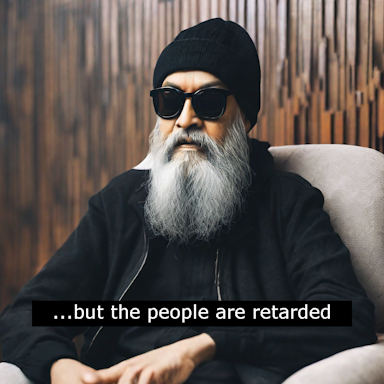"The health of a democratic society may be measured by the quality of functions performed by private citizens." - Alexis de Tocqueville
Alexis de Tocqueville, a prominent French political thinker and historian of the 19th century, holds a revered place in the realm of political philosophy. His seminal work, "Democracy in America," offers profound insights into the challenges and complexities of democratic societies. Tocqueville's concerns about centralized power and the dangers of individualism were prescient and have unfortunately become a reality in today's world. However, the isonomic model of decentralized governance presents an intriguing solution that aligns remarkably well with Tocqueville's ideas. This blog post will delve into Tocqueville's key points, explore the current manifestation of his concerns, and highlight how the isonomic model addresses these issues, likely earning Tocqueville's approval.
Tocqueville's Concerns
Risk of Centralized Power: Tocqueville was wary of the potential for a strong central government to become too influential and undermine individual freedoms. He recognized the benefits of equality but feared the concentration of power in the hands of a few.
Dangers of Individualism: Tocqueville observed that early American democracy thrived when communities had common values and social ties. However, he warned that the rise of individualism could erode social cohesion, weaken civic engagement, and ultimately lead to societal fragmentation.
Threat of Conformity and Mediocrity: Tocqueville expressed concerns that the pursuit of equality might result in a leveling down of individual excellence and ambition, fostering mediocrity and stifling innovation.
Potential for Despotism: While appreciating the positive aspects of democracy, Tocqueville remained mindful of the risk that it could devolve into a form of soft despotism, where citizens willingly surrender their freedoms for government protection and stability.
Tocqueville's Concerns in Today's Reality
Regrettably, Tocqueville's concerns have materialized in modern society. The forces of individualism have weakened the social fabric, eroding trust, and fostering polarization. Membership in voluntary associations has declined, contributing to a decline in civic participation. The concentration of power in centralized governments has become a growing concern, potentially infringing upon individual liberties. Furthermore, conformity and mediocrity are pervasive in many aspects of society, hindering the cultivation of excellence and ambition.
The Isonomic Model's Response
Decentralized Governance: The isonomic model not only echoes but actively embodies Tocqueville's call for decentralized governance. Through the implementation of Functional Overlapping Competing Jurisdictions (FOCJs), organized as canopies and stratums, the model empowers local communities, granting them the autonomy to govern independently while fostering interconnectedness. This strategic approach ensures a more equitable distribution of power, effectively addressing the inherent risks associated with centralized authority.
Balancing Local Rule and Coordinated Governance: Tocqueville emphasized the importance of balancing local participation with higher-level decision-making. The isonomic model thoughtfully incorporates this principle, allowing for localized rule within canopies while providing channels for representation at higher levels through the Multigroves Council and Canopies Council.
Encouraging Civic Engagement: Tocqueville regarded local participation as essential for promoting civic engagement and citizenship. The isonomic model's emphasis on participatory governance, with initiatives and referendums, encourages active citizen involvement and fosters a sense of ownership and responsibility.
Revitalizing Social Bonds: Tocqueville recognized the significance of voluntary associations in strengthening social bonds. The isonomic model acknowledges the decline in such associations and seeks to address this challenge by revitalizing them, thereby promoting shared purpose, understanding, and collaboration among citizens.
Consensus-Based Decision-Making: The isonomic model advocates for consensus-based governance, aligning with Tocqueville's belief in the importance of finding common ground and fostering collaboration. Through FOCJs, decision-making rights are distributed among citizens, challenging the concentration of power among politicians.
Embark on a transformative journey with the Isonomic Manifesto. Join our Discord channel to be part of dynamic discussions, share your insights, and contribute to shaping the future of decentralized governance and civic engagement. Your voice matters—be a catalyst for change today!
Isonomics and Tocqueville's Vision for the Future
In envisioning the future, Tocqueville may find solace in the isonomic model's potential to evolve into a comprehensive system that not only addresses his concerns but becomes a beacon of 21st-century democratic governance. The multigrove structure, inspired by Tocqueville's insight into social bonds, presents a dynamic framework capable of fostering global cooperation and addressing issues transcending traditional boundaries.
The isonomic model, by embracing Tocqueville's emphasis on local participation and balanced governance, has the potential to rejuvenate civic life and strengthen the democratic fabric. Its adaptive nature allows for continuous refinement, ensuring that it remains resilient in the face of evolving challenges, much like Tocqueville envisioned.
Conclusion
The isonomic model presents an intriguing response to Tocqueville's concerns about centralized power and individualism. By embracing decentralized governance, promoting civic engagement, and revitalizing social bonds, the isonomic model aligns well with Tocqueville's vision of a balanced and harmonious society. While Tocqueville may still see room for some intervention from higher levels of government, the isonomic model's emphasis on local participation, consensus-based decision-making, and protection against the risks of despotism would likely earn his approval. As we grapple with the challenges of democracy in the 21st century, the isonomic model offers a promising path forward, embodying the spirit of Tocqueville's insightful observations and striving to create engaged, consensus-oriented communities for a better tomorrow.

